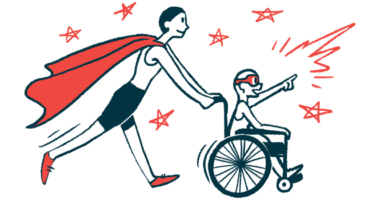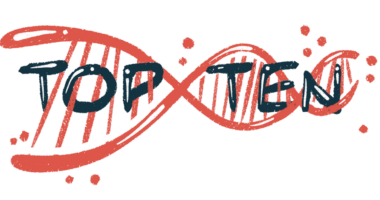Community Helps Us Innovate, Learn, and Advocate for Change

We throw around the word “community” a lot in the rare disease space, but don’t always think about what it really means and how it’s vital for patients, family, friends, and caregivers.
I rarely see anyone in a wheelchair in public, let alone a power chair. Growing up, I didn’t have many friends with physical disabilities. I was always the one who was outwardly different.
As my parents’ foundation, CureDuchenne, grew and I met more boys and young men with Duchenne muscular dystrophy, I finally felt like I wasn’t alone. There’s nothing like hearing someone’s story and being able to say, “Hey, me, too!”
I’ll admit I was apprehensive at first about becoming friends with those who shared my diagnosis. Even though I was in a scooter and a power wheelchair, I wasn’t sure how to interact with them. After all, I was around able-bodied children at school.
But now that I do have a handful of friends with the same condition, I wish I could have known them sooner. We help each other — I learn from them, and they learn from me. I’ve also met parents of boys with Duchenne, and now that I’m older, I can relate to what their kids are going through and learn nifty tips and tricks about how to live with Duchenne.
Fostering and building community helps us innovate, forge lasting bonds, support each other through triumphs and tribulations, and use our numbers to make changes in Washington, D.C., that accelerate treatments and improve our quality of life. As the saying goes, “It takes a village.”
When I encounter another person with Duchenne, I usually learn something new, whether it’s about a wheelchair attachment, a clinical trial showing promising results, or a strategy to find a personal care assistant during a nationwide caregiver shortage. And I, in turn, give them food for thought. New ideas about how to improve our quality of life are born, and everyone wins.
That’s why I’m excited to speak at and attend our foundation’s Futures in-person and virtual event in Florida this May. (Hopefully, I’ll see some of my readers there.) At the last in-person conference in 2019, I met some of the people with Duchenne who have become part of my group of friends. And coincidentally enough, this year’s agenda will focus on building community.
We can make changes in Congress together. While Duchenne is a rare disease, there are more of us than lawmakers probably think.
It’s estimated there are 15,000 people with Duchenne in the U.S. That seems like a small portion of the population, but together it’s a lot. We can push for legislation, such as newborn screening for Duchenne; access to early diagnosis and care; the BENEFIT Act, which would compel pharmaceutical companies to look at patient experience feedback in risk assessments; and the orphan drug tax credit, which incentivizes pharmaceutical companies to invest in rare conditions like Duchenne.
While my able-bodied friends have been extremely supportive and helpful, they can never understand what I go through every day. Those in my Duchenne community can. We know what makes life hard. We know how important the small things are, like maintaining our ability to play video games, lifting a glass to our mouth unassisted, or getting a good night’s sleep. We know how to celebrate what many others take for granted, whether it’s graduating high school, going away to college, or finding a job.
There’s an unspoken understanding between us, and it’s refreshing not to have to explain myself. We should seek each other out more frequently. Together, we can use what we have in common to make life better for our generation and those that will come.
Note: Muscular Dystrophy News is strictly a news and information website about the disease. It does not provide medical advice, diagnosis, or treatment. This content is not intended to be a substitute for professional medical advice, diagnosis, or treatment. Always seek the advice of your physician or another qualifiedw health provider with any questions you may have regarding a medical condition. Never disregard professional medical advice or delay in seeking it because of something you have read on this website. The opinions expressed in this column are not those of Muscular Dystrophy News or its parent company, Bionews, and are intended to spark discussion about issues pertaining to muscular dystrophy.








Leave a comment
Fill in the required fields to post. Your email address will not be published.